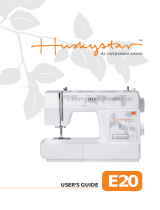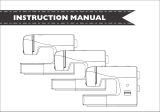
KNOWING YOUR SEWING MACHINE / CONOZCA SU MÁQUINA DE COSER
——————————————————————
24
Stitch Length Dial
Control de longitud de puntada
Depending on the selected stitch, you may need to
adjust the stitch length for best results.
The numbers marked on the stitch length dial
represent the stitch length in millimeters (mm) (1/25
inch).
THE HIGHER THE NUMBER, THE LONGER THE
STITCH. With the “0” setting, material is not fed.
This is used when sewing a button.
The “F” range is for making a satin stitch (close
zigzag stitch), which is used for making buttonholes
and decorative stitches. The position needed for
making the satin stitch varies according to the
material and thread being used. To determine the
exact dial position, first test the stitch and length
settings on a scrap piece of fabric to observe the
feeding of the material.
Según el tipo de puntada seleccionado, es posible que
necesite ajustar la longitud de la puntada para
obtener los mejores resultados.
Los números indicados en el control de longitud de
puntada representan la longitud de la puntada en
milímetros (mm) (1/25 pulg.).
CUANTO MAYOR SEA EL NÚMERO, MÁS LARGA
SERÁ LA PUNTADA. Con el ajuste “0”, el material no
se arrastra. Este ajuste se emplea para coser botones.
El intervalo “F” está destinado a la costura para satén
(puntada en zig-zag pequeña), empleada para
realizar ojales y para costura decorativa. La posición
adecuada para la costura para satén varía según el
material y el hilo que se utilicen. A fin de determinar
la posición exacta del control, realice primero una
prueba de la puntada y la longitud elegidas en un
retal para observar el avance del material.
.
1 Stitch length dial / Control de longitud de puntada
2 Shorter / Más corta
3 Longer / Más larga
Stretch Stitching
Costura elástica
Raise the needle to its highest position by turning the
handwheel toward you (counterclockwise) so that
the mark on the handwheel points directly up.
Suba la aguja a la posición más alta girando la rueda
hacia usted (hacia la izquierda), de manera que la
marca de la rueda apunte hacia arriba.
■ 35 Stitches / 35 puntadas
Selecting a Stretch Stitch
Setting the stitch length dial to “ ” or “ ”
changes the selected pattern to a stretch stitch.
Selección de un tipo de puntada elástica
Si se ajusta el control de longitud de puntada en
“ ” o “ ”, la puntada seleccionada cambia a
un tipo de puntada elástica.
■ 25 Stitches / 25 puntadas
Selecting a Stretch Stitch
Setting the stitch length dial to “ ” changes the
selected pattern to a stretch stitch.
Selección de un tipo de puntada elástica
Si se ajusta el control de longitud de puntada en “ ”, la
puntada seleccionada cambia a un tipo de puntada elástica.
1
2
3
1
● If the stitches are bunched together,
lengthen the stitch length and continue
sewing. Do not continue sewing without
lengthening the stitch length, otherwise
the needle may break and cause injury.
● Si las puntadas quedan amontonadas,
alargue la puntada y continúe con la
costura. No siga cosiendo sin alargar la
puntada, pues la aguja podría romperse y
causar lesiones.
CAUTION/PRECAUCIÓN






















